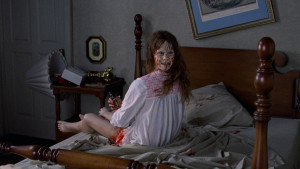Since their inception in the 1920s – 1960s, horror movies have dealt mainly with monsters, ghosts, and other creatures. That changed in 1968 when Roman Polanski’s “Rosemary’s Baby” was released. While it wasn’t the first film to deal with the Devil or the occult, it was the most mainstream at the time. Due to its critical and financial success, this opened the door for more films about the occult and demons to be made. Five years after “Rosemary’s Baby,” one of the scariest and most popular horror films was released. Its impact in popular culture would be felt for years to come. The film? “The Exorcist” (I viewed the original theatrical version for this review).
Based on the novel of the same title by William Peter Blatty, “The Exorcist” tells the story of Regan, a 12-year-old girl who becomes possessed by a demon, Pazuzu. Regan’s mother, Chris McNeil, searches to find someone who will help her daughter’s ailment. Having exhausted all medical options, Chris turns to the Catholic Church, where she is put in touch with a priest, Father Karras.
One of the strongest elements of “The Exorcist” is its acting. The entire cast gives amazing performances, a rarity in horror films. Ellen Burstyn’s Chris is a mother who, despite being gone long hours working on a film, cares for her daughter very much. Her struggles to understand what is happening and her desperation in finding a cure is something with which any parent could identify. Father Lankester Merrin, played by Max von Sydow, provides a look into a solemn man who’s encountered a terrible secret from his past he must confront again. He knows the evil he must face and goes forth willingly, despite knowing Pazuzu’s danger more than anyone else involved. Linda Blair’s Regan is a bystander in all of this. Her innocence and good nature provide the perfect vessel for pure evil to take over her body and soul, slowly and connivingly. Father Damien Karras, portrayed by Jason Miller, portrays a priest who has lost his way with religion after a tragic event in his life. A psychiatrist too, he attempts to explain things with science first and is unwilling to believe in the supernatural. The remaining supporting cast of Lee J. Cobb, Kitty Winn, Jack MacGowran, and Father William O’Malley fill their roles effortlessly.

The true horror of this film isn’t gore, monsters, ghosts, or other sick and twisted creatures. The film is not about religion, or God and Satan: it’s about how even the most pure individuals can be corrupted and there are things in life we are powerless over. Regan’s corruption by Pazuzu isn’t by accident; she embodies the innocence that society believes can never be touched or harmed by outside forces. She is a typical 12-year-old girl who enjoys arts and crafts and has imaginary friends. Her transformation is slow, as she starts swearing and displaying brute strength, prolonging the suffering the audience must endure. Once Pazuzu finally takes over, it’s almost a relief as Regan is aware that something isn’t right with her, but is powerless to stop it. He’s akin to an illness or cancer: No one, not even Chris, doctors, or psychiatrists can cure Regan.
There is also a theme of loss of faith and loss in general. Father Karras experiences this more than anyone. How he deals with this loss is more important. Most priests probably would turn to God for answers or reasons, but Karras retreats from these notions. His feelings seem to come more from guilt about what he could’ve done differently. His role as both a priest and psychiatrist seem contradictory since religion has long regarded mental illness as the work of demons or the Devil himself. This may be part of the reason he offers to see Regan, in an attempt to reassure Chris that Regan’s actions are because of a disorder and not that of possession.
– by Mike Surerus